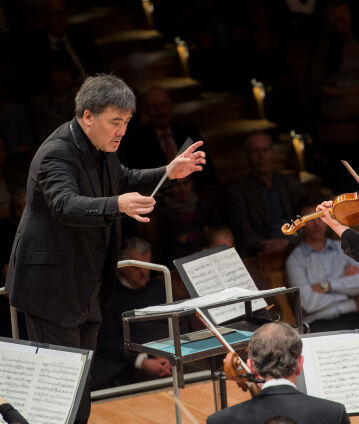Alan Gilbert and Frank Peter Zimmermann

Modern music of the fleet-footed type characterises the beginning of this concert: with Béla Bartók’s youthfully animated Second Violin Concerto and the ingenious, jazzy minimalism of John Adams. The main symphonic work of the evening is a contrast: Tchaikovsky’s Fourth with its powerful world-weary sounds. Alan Gilbert conducts, and the soloist is the violinist Frank Peter Zimmermann.
Many people were taken by surprise when Alan Gilbert, then the chief conductor of the Royal Philharmonic Orchestra in Stockholm, was appointed Music Director of the New York Philharmonic Orchestra in the 2009/10 season. After all, the native of New York was the youngest chief conductor to head up the orchestra, and since Leonard Bernstein the first American to assume this prestigious position in the music world. Alan Gilbert first conducted the Berliner Philharmoniker in February 2006; at his subsequent Philharmonic concerts as well he always appeared, in the opinion of the Berliner Morgenpost, like a “radiant winner”. “I had,” the unpretentious maestro has said, “the good fortune to study with Bernstein. His enthusiasm had even more of a formative effect than his style. His love of music and of people – which was the same for him – has been a very important influence.”
At this year’s guest appearance in Berlin, Alan Gilbert takes on two works by this year’s Composer in Residence John Adams: Short Ride in a Fast Machine is a work in which the music flows through the room with rhythmically pulsating force and seems to suspend the laws of gravity with light instrumentation; in addition, the orchestra plays Lollapalooza for large symphony orchestra, composed as a gift for Sir Simon Rattle’s 40th birthday: the motifs that overlap in ever different ways, the complicated rhythms, make this music a thrilling furioso until the last beat of the drum.
With Béla Bartók’s Second Violin Concerto, the programme continues with a lyrical work that contains “warmly flowing, happily singing melodies” and is “elated by a youthful fervour” (György Kroó). The soloist is Frank-Peter Zimmermann, one of the most distinguished violinists today, known around the world for his brilliant playing – full of elegance, facility, intensive magnetism and tastefully proportioned vibrato: “To play Bartók’s Second Concerto with an outstanding orchestra is unbelievably gratifying.” The evening is rounded off with Pyotr Tchaikovsky’s Fourth Symphony, in which, in the words of the well-known music critic Hermann Laroche, the composer artfully succeeded in “combining the tragic with the insouciance of ballet-like rhythms”. Tchaikovsky himself called the threatening-sounding brass fanfare at the beginning the “seed” of the whole symphony. “This is Fate, that fateful force which prevents the impulse towards happiness from attaining its goal.”
© 2016 Berlin Phil Media GmbH
Related interview
Artists
Our recommendations
- Alan Gilbert and Frank Peter Zimmermann with Bartók’s First Violin Concerto
- Daniel Harding and Frank Peter Zimmermann
- Memorial concert for Claudio Abbado with Simon Rattle and Frank Peter Zimmermann
- 1993 Europakonzert from London with Bernard Haitink and Frank Peter Zimmermann
- Paavo Järvi conducts Beethoven and Hindemith
- A “Czech Evening” with Jakub Hrůša and Frank Peter Zimmermann